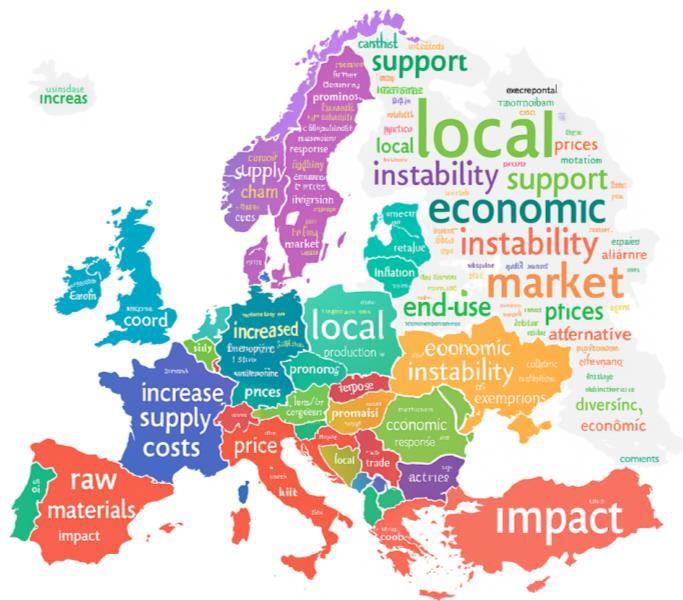Faced with the growing threat of global tariffs and shifting trade dynamics, Afera surveyed its Members to better understand how the European adhesive tape industry is preparing for potential disruption. The results reveal a sector actively grappling with cost pressures, supply chain risks and the need for strategic foresight.
In his late February article, “A thought experiment on tariffs”, Afera President Evert Smit, who is also director scouting for sustainability, technology and innovation at Lohmann GmbH & Co. KG, outlined the value of preparing for uncertainty before it strikes. The story contrasted two companies—one reactive, one proactive—navigating a sudden trade shift. The proactive company had practised disruption through scenario building. When real-world tariffs hit, they adjusted with confidence. The other struggled to catch up, clinging to efficiency over adaptability.
How do companies perceive and prepare for the impact of tariffs?
This story wasn’t just fiction—it inspired Afera’s recent survey on how companies perceive and prepare for the (potential) impact of global trade measures and tariffs. Conducted anonymously across Afera’s Membership from 31 March to 9 April, the survey posed five open-ended questions and received dozens of insightful, thoughtful responses. The results help paint a picture of how the industry is thinking—and acting—as trade dynamics continue to evolve.
Five questions, many signals
Will EU–US tariffs affect your business?
Yes—and not just directly. While some companies do not trade with the U.S. directly, most expect indirect impacts. With the U.S. market less accessible to Asian exporters, Europe could become a dumping ground for cheaper products, particularly from China. This threatens profitability and weakens European producers’ competitive position. Key concerns include:
- Rising costs across supply chains
- Disrupted procurement and raw material sourcing
- Export hurdles, inflationary pressure and oversupply in EU markets
A few firms expect little to no direct impact, but they acknowledge the risk of ripple effects via customers or markets linked to transatlantic trade.
What will be the biggest impact on your business if tariffs evolve?
Three themes stood out:
- Raw material cost increases: Most companies foresee input costs rising dramatically. Some fear exploding cost structures if tariffs escalate.
- Supply chain instability: Logistics, distribution and production planning are already under pressure. A fractured trade system will worsen this.
- Economic slowdown: Several respondents fear a broader recession, with decreased investment, lower production volumes and shrinking demand.
One participant summed it up: “Tariffs won’t just shift trade—they’ll reshape the economy. We’re not exempt.”
Which part of your value chain is most vulnerable?
This question delivered a nearly unanimous answer: raw materials.
Tape producers typically rely on globally traded base substrates and specialty chemicals. These are not easily substituted or localised, especially when strict quality or regulatory requirements apply. The following points were raised repeatedly:
- Unequal global distribution of raw material production
- Long timeframes and high costs to relocate or replicate capacity
- Dependence on certified sources, some of which are extra-EU
Interestingly, converting and end-use processes were seen as less affected—because they tend to be more local and flexible.
What are you doing—or planning—to mitigate the risks?
This question showed the strongest alignment with Smit’s scenario planning framework. Many respondents are already taking steps similar to those of the proactive “Company B” in his article:
- Localisation of sourcing and manufacturing
- Diversification of supply chains and geographical sourcing
- Mapping of critical supply chain nodes
- Building buffer stocks and increasing working capital
- Stronger partnerships with customers and suppliers
- Price communication strategies with customers
Others admitted that being proactive is difficult without more clarity—but recognised the need to prepare nonetheless.
What should Afera, the European Adhesive Tape Association, do?
Members clearly see Afera as a facilitator in this complex environment. Recurring requests included:
1. Provide clarity
- What materials and tariff codes are affected?
- What are the financial and regulatory consequences?
- How can companies access reliable, short summaries?
2. Strengthen advocacy
- Make representation to the European Commission
- Advocate for certified EU-level recycling standards
- Promote fairness in trade, especially against underpriced imports
- Work with CEOs and associations to shape a coordinated message
3. Raise industry visibility
- Educate tape users and adjacent industries
- Campaign for local-to-local production
- Reinforce the strategic importance of the tape industry in value chains.
So where do we go from here?
This survey has confirmed that many Afera Members are already moving in the direction that scenario builders recommend: diversifying, localising, mapping and communicating. But it also shows that the industry needs support, especially in the form of:
- Better information
- More visibility
- Coordinated responses at the EU level.
Smit has already shared these insights in his presentation made at PSTC’s Tape Week in May. Afera’s next steps are to work on communication materials tailored to Member concerns and to define advocacy priorities aligned with what Members need most. Afera’s Steering Committee will be addressing the survey outcome during their day-long strategy session in June at Assogomma’s offices in Milan, and Smit, as well as several other speakers, will address this topic during their presentations at Afera’s inaugural European Tape Week from 22 to 26 September in Thessaloniki, Greece.
In a VUCA world, the ability to anticipate—not predict—and act—not just react—can make the difference between surviving and thriving. As Smit’s article puts it: “Scenario building is not about predicting the future but preparing for it.”

